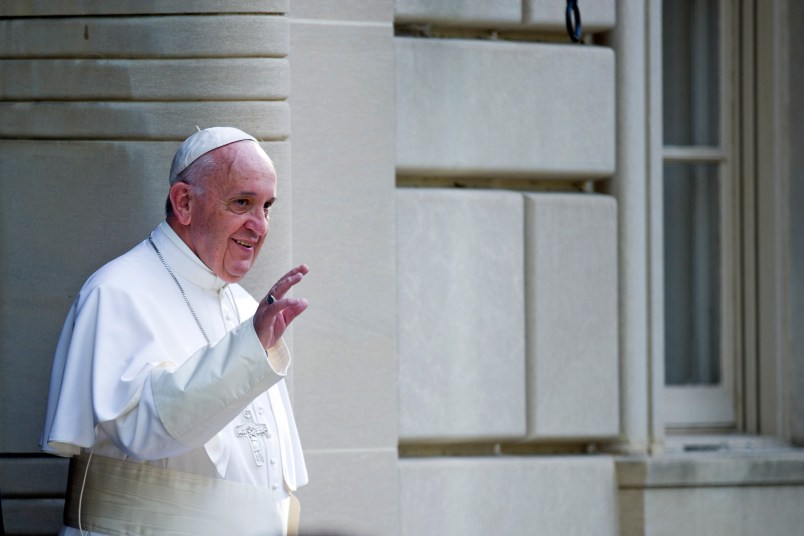VATICAN CITY (AP) — Pope Francis on Saturday scrapped his proposed tribunal to prosecute bishops who covered up for pedophile priests after it ran into opposition and instead clarified legal procedures to remove them if the Vatican finds they were negligent.
The new procedures sought to answer long-standing demands by survivors of abuse that the Vatican hold bishops accountable for botching abuse cases. Victims have long accused bishops of covering up for pedophiles, moving rapists from parish to parish rather than reporting them to police — and suffering no consequences.
But the new law was immediately criticized by survivors of abuse as essentially window dressing since there were already ways to investigate and dismiss bishops for wrongdoing — they were just rarely used against bishops who failed to protect their flocks from pedophiles.
Analysts suggested the new law was much ado about very little.
“There is nothing breaking here: The congregations could already do that,” said Kurt Martens, professor of canon law at The Catholic University of America.
He said what is significant about the new law is that it makes no mention of the original proposal for the tribunal, which would have treated negligence as a crime and prosecuted it as such.
“Does that mean the tribunal isn’t going to come because there was too much opposition?” he asked.
The main U.S. victims’ group, SNAP, said it was “extraordinarily skeptical” that the new procedures would amount to any wave of dismissals since popes have always had the power to oust bishops but haven’t wielded it.
“A ‘process’ is helpful only if it’s used often enough to deter wrongdoing. We doubt this one will be,” SNAP’s David Clohessy said.
In the law, Francis acknowledged that the church’s canonical code already allowed for a bishop to be removed for “grave reasons.” But he said he wanted to precisely state that negligence in handling abuse cases counted as one of those reasons.
Bishops “must undertake a particular diligence in protecting those who are the weakest among their flock,” Francis wrote in the law, called a motu proprio.
The statute essentially does away with a proposal approved by Francis last year to establish an accountability tribunal inside the Congregation for the Doctrine of the Faith to hear negligence cases. Francis’ sex abuse advisory board had recommended that the Congregation prosecute negligent bishops because it already oversees actual sex abuse cases against clergy.
But that proposal posed a host of legal and bureaucratic issues and ran into opposition from bishops and the Vatican bureaucracy. In the end, Francis backed off and instead essentially reminded the four Vatican offices that already handle bishop issues that they were also responsible for investigating and punishing negligence cases involving abuse.
Marie Collins, an abuse survivor who is a member of Francis’ abuse advisory board, said while it was “depressing” that the tribunal proposal had stalled for a year, the new procedures emphasizing negligence show that bishop accountability “has not been allowed to disappear into the sand.”
“As a survivor, I am hoping the congregations involved will implement these new procedures as speedily as possible, as the success or failure of any initiative can only be judged on visible results,” she said in an email to The Associated Press.
In the law, Francis said a bishop can be removed if his actions or omissions cause “grave harm” — physical, moral, spiritual or financial — to individuals or communities. The bishop himself doesn’t need to be morally guilty. It’s enough if he is purely lacking in the diligence required of his office.
The procedures call for the Vatican to start an investigation when “serious evidence” is provided that a bishop was negligent. The bishop can defend himself. At the end of the investigation, the Vatican can prepare a decree removing the bishop or ask him to resign.
Any decision to remove the bishop must first be approved by the pope, who will be advised by legal experts, the law says.
Even before the new procedures were announced, two U.S. bishops who bungled abuse cases resigned on their own: Bishop Robert Finn in Kansas City-St. Joseph, Missouri, and Archbishop John Nienstedt in St. Paul and Minneapolis.
___
Follow Nicole Winfield at www.twitter.com/nwinfield
Copyright 2016 The Associated Press. All rights reserved. This material may not be published, broadcast, rewritten or redistributed.







Frank, you would be wise to come back with something that has real teeth and real reach. This isn’t the 1920s where you could “tidy” things up.
When it comes to exposing the criminality, immorality, treachery and human atrocities brought to us by the Catholic church, no one does it better than dearly departed Christopher Hitchens. Some day, people will simply stop supporting the horrible Catholic monsters and start incarcerating its many child rapists, pedophiles and money-grubbing con men.
https://www.youtube.com/watch?v=rAxgnd8mYr0Hey Pope Frank! Please explain to me in simple terms why it has been so difficult to remove the pedophile priests, and the bishops and cardinals who have protected them. Seems like a mortal sin to me, but then I haven’t had years of training in Catholic theology. Well actually, I had 12 years of it and they never seemed to have any problem telling me when I screwed up. I thought the Roman Catholic Church held itself to high standards of morality and spirituality.
No, I guess not.
The nudge nudge, wink wink say-what-you-willy-nilly reasoning.
If the congregation for the doctrine of the faith is where he tried to establish the new tribunal, it might well make sense for him to pull the plug rather than let the old guard run the process. They might have ended up giving pedophiles and their enablers special medals for merit.